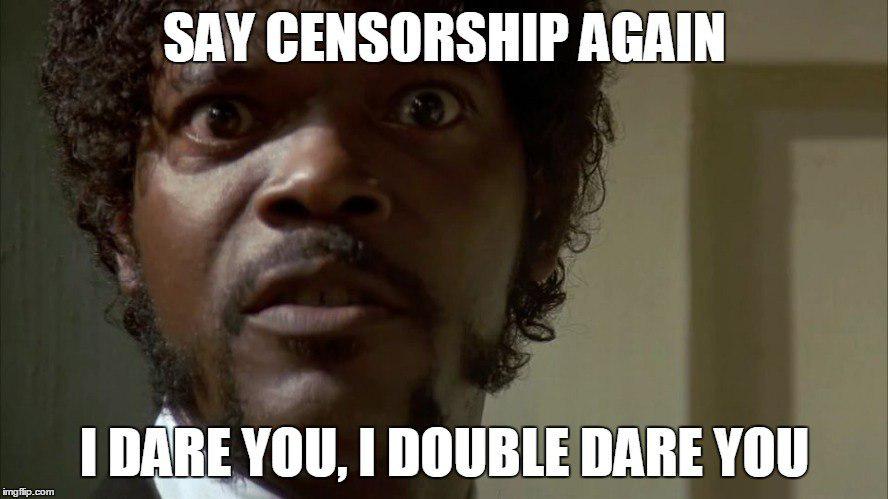
Mind Your Words!
Do you know someone who has “sworn a lot in Twitter”? It’s not unusual to see complaints and cries on the Internet about daily situations that, at times, are filled with swear words and more energetic expressions. Not much is necessary: that indifference when being served in the bank or the bakery; a toy that came with a fabrication defect… Going through these unpleasant situations can give us the will to emphatically denounce these harmful practices — and use the chance to vent your indignation too. Leaving your irritation explicit can make other consumers be cautious in order not to suffer from the same problem. Good idea? And if, even after all this work, this venting was removed from the Internet by the Judiciary?
Swearing is really common in the notorious Otário Channel, on Youtube. The channel takes the complaint and the denounce to the extreme with videos and more videos of criticisms to political and company practices. One of the posts, however, ended up bothering to the point of being targeted by a lawsuit. The Bradesco Bank — aimed by the complaints — wanted the removal of the video.
The case began in 2012. At the time, Otário Channel published a video in which it made some harsh criticisms to one of the products of the bank, “Hiperfundo Bradesco”, saying that it was an investment to “trick losers” and recommending the search for other banking options. To protect its honor, Bradesco filed a lawsuit so that Google, controller of the video platform, would remove the content and block its access through the search engine.
In the lower court, Google was forced to exclude the video. This decision, however, did not please any of the parties — both appealed. On one side, Bradesco considered the sentence insufficient, understanding that the search engine should have been forced to block the access to the video through other means as well. On the other, Google was unsatisfied with the obligation to remove the video, arguing that the content wasn’t extremely offensive and, even in the possibility that it was, it was up to the bank to fight for the indemnity against the author of the video, and not to fight the platform in which it was published.

The appeals went to court in the beginning of this year. In a decision in favor of Google, the 7th Chamber of Private Law of the São Paulo Court of Justice considered that the content of the video did not attack the objective honor of the bank, finding itself within the limitations of the “legitimate exercise of the right to the free manifestation of thought”: the consumer has the right to expose their dissatisfaction. Besides, it pondered that “no one is more subjected to criticism than a company of the plaintiff’s size, one of the biggest private banks in our country”.
The case brings an important discussion when considering a discourse filled with swearing to be “socially acceptable”, which many argue to be an abusive use of freedom of speech. When allowing the circulation of Otário’s complaints, the Court expanded the limits of this right, understanding that it also encompasses the use of a sharper and even “less polite” language to pass an idea. The message is clear: it is possible to lay heavy on the ink if that is part of being outraged. The use of swear words and the comparison of the investment to an “armed robbery” can be legitimate artifices used by the author of the video to transmit, in a more overwhelming manner, their message of irritation with the bank’s product. How would a society in which complaints of this kind could only be articulated in a polite manner be?
This is deepened if considered the existing asymmetry in the consuming relations and its impact on the exercise of freedom of speech by consumers in general. If this relation usually implicates in a great disparity of forces between the provider of products and services (many times an influent company, of great size, and with access to resources) and the client, it can be more than fair to assure the consumer the right to place a scathing criticism of the provided services if it is minimally guided in reality.
The fact that the freedom of speech is a right assured to all by the Constitution does not make its distribution in society to be fair. In the case that we are discussing it is easy to understand the meaning of this inequity: the bank can use — and probably does — of publicity in diverse spaces to spread its products and services and build a positive image of them, while the reach of the voice of an unsatisfied consumer is infinitely smaller.
Looking at this situation from the perspective of the inequality of who is expressing themselves helps us to perceive the importance of protecting the criticism, even if virulent: besides representing, in practice, a minimal threat to the activities of a large company, the video could have value as a source of information to people eventually interested in investing in the product offered by the bank. In order to not stain its image, the bank would end up silencing a consumer and intervening in the access to information by potentially interested parties in the video’s content. Losing your composure can also be freedom of speech.
***
InternetLab released Dissenso.org, a platform of reference on freedom of speech on the Internet. This and many other cases are categorized in Dissenso.org’s library of cases (in Portuguese), access now!
By Francisco Brito Cruz and Thiago Dias Oliva
Translation: Ana Luiza Araujo